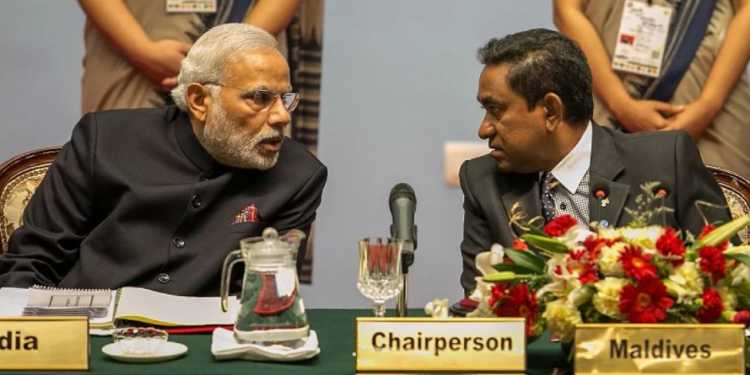The bilateral relations between India and Maldives are in stormy waters since Abdullah Yameen became president in November, 2013. In a latest blow to Maldives, India has slashed the amount of restriction free exports of essential commodities permitted to the island nation every year. According to a notification by the Directorate General of Foreign Trade (DGFT) the country has cut by half or more the exports of rice, potatoes, onion and dal to the island nation free of restrictions. The export of wheat flour was also slashed to a bare minimum level. Maldives is an island nation of 4.27 Lakh people located in the Indian Ocean near the south western border of the country near Lakshwadweep. It got independence from the United Kingdom in 1965 and since India has been its most important ally. The country imports all of its food requirements from India. Both the countries are founding members of the South Asian Association for Regional Cooperation (SAARC), the South Asian Economic Union and signatories to the South Asia Free Trade Agreement (SAFTA). India signed a comprehensive trade agreement with Maldives in 1981, under which it allows restriction free exports of most essential products like foods and cloths to the country. Article IX of the agreement specifies that, “The Government of Maldives will furnish to the Government of India a list of essential commodities required by the former in a calendar year by the end of November of the year preceding the one to which the requirement relates.”
India has played a very important role in the development of Maldives since its independence. It provided economic aid and participated in bilateral programs for the development of infrastructure, health, civil aviation, telecommunications and labor resources. The State Bank of India contributed 500 billion for the economic expansion of the Maldives. India maintains two permanent bases in the country for surveillance capabilities. The Indian Navy gifted a Trinkat Class Fast Attack Craft of 46m length to Maldives National Defense Force to strengthen its domestic security. Both countries enjoyed very warm ties before the election of Abdullah Yameen who came to power in 2013. Since assuming the responsibilities of the state, he has shown a clear leaning towards China and allowed Chinese companies to build infrastructure in the country. His policies include anti western rhetoric and he openly supports Islamization of the Maldivian society, to which India does not consent. Abdullah Yameen has declared a state of emergency in the country in February this year, therefore further elections and a change of regime is not possible. He has also told India to take back two Dhruv advanced light helicopters which had been gifted to the nation back in 2013 along with the 26 Navy personnel who are currently posted in Maldives to maintain and run the machines. There are almost 25000 Indian workers in Maldives who helped build the country and played an important role in the better socioeconomic conditions that the country enjoys today. But the work visas of 200 workers were not renewed by the government and some newspapers in the country carried advertisements that Indian workers are not allowed.
India is retaliating to the actions of Abdullah Yameen because the Maldives president is trying to hurt the strategic interests of India. Earlier this month, India refused entry to a Maldivian Member of Parliament who is a close aide of Yameen, even though he is entitled to visit India as a legislator. The Maldivian president should understand that the very life of his nation depends on Indian exports. Importing from China or any other country will not be economically viable because the distance is too much. India, showing its humanitarian behavior, has maintained the supplies up to a level where people of the country could survive. The administration also said that people to people ties will be maintained despite differences between the governments. Maldives government should understand that its economy totally depends on investments from India, and going against its neighbor will cost them in the long run.

























